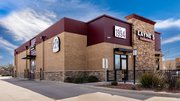News
Ketchup time: Credit enters fast-food realm
Some worry service isn't healthy for consumers' debts.
September 11, 2004
09:18 PM CDT on Sunday, September 12, 2004 The Dallas Morning NewsFries or onion rings ... diet or regular ... and now, paper or plastic. Fast-food industry giants are finally taking their place as the last major link in the food chain to take plastic for payments. After decades of shunning credit cards as too slow for fast food, McDonald's, Burger King, Taco Bell and other major chains in the $144 billion-a-year industry now welcome customers' credit and debit cards. This year, nearly every top chain launched or greatly expanded a program to accept plastic. By the end of the year, more than 33,000 outlets – at least 12 percent of the total – will accept some form of electronic payment, according to officials with the major chains. And it's just the beginning, experts say. Some credit counselors worry that consumers may use their purchasing power to fatten their debt loads. But with cashless cheeseburgers within reach, many consumers say bring it on. Leaning over a half-eaten meal of Chicken McNuggets and fries, Tonisha Denmark said her life would be easier if she could use her credit card at McDonald's – her son's favorite eatery. "Normally I don't travel with cash," said the 25-year-old student at the University of Texas at Dallas, who was dining at a McDonald's in Plano. "You can lose cash. And credit cards help you keep a better paper trail." Upon learning that by year's end at least 8,000 of the 13,500 U.S. McDonald's plan to welcome plastic, Ms. Denmark flashed a toothy grin, then lifted her arms. "Give praise," she said. "This will be a good thing."Year of charge cardThis has been the year of the charge card in the fast-food arena.· McDonald's, the nation's largest fast-food chain, launched its credit and debit card program this spring.Last month, it announced it would begin accepting MasterCard's PayPass, which uses radio frequency technology, starting this fall at about 1,000 restaurants in Dallas and New York· Burger King, the No. 2 chain, also began rolling out its cashless program this year.Today, an estimated 4,500 outlets, or about 60 percent of the total, accept credit or debit cards.· Wendy's International began its rollout a year agobut had to wait until enough stores were on board to justify a national ad campaign this year announcing the program, a spokesman said.· Taco Bell also joined the clubwith its 1,300 company-owned stores and many of its 5,300 franchised or licensed units.· In July, Jack in the Box announced that it accepts Visa, MasterCard and Discoverin all 1,553 company-owned stores and many franchised sites. Restaurants stand to increase sales from the programs. Wendy's, for example, said the average check of a patron paying with plastic is about 35 percent higher than that of cash buyers. Likewise, Corpus Christi-based Whataburger sees about a 38 percent bump in the average check of card-carrying patrons. Whataburger, which has 632 stores, was one of the first fast-food chains to begin offering a credit payment option, launching its program in 1989, said Todd Coerver, vice president of brand management. Most other segments of the restaurant industry have been allowing patrons to pay with credit or debit cards for decades.Why was fast food so slow?With speedy service its lifeblood, major chains and many of the franchisees feared delays related to electronic transactions. "What has lagged in our industry is the ability to make these transactions at a speed that's acceptable to our customer," said Bill Whitman, a spokesman for McDonald's. Fifteen years ago, an electronic purchase took 15 seconds to dial out, another five seconds for an authorization and 10 more seconds for a signature. Thirty seconds is a big deal in an industry that tries to get customers served in less than a minute. Today's faster modems and dedicated lines that offer a constant connection can reduce those times by as much as 11 seconds. Eliminating the need for a signature can cut the transaction time to less than 10 seconds. About three years ago, credit-card companies, software merchants and point-of-sale equipment makers saw the fast-food industry as an untapped bonanza. Credit-card companies devised programs especially for small-ticket customers. Fast-food merchants who sign up for MasterCard's "quick payment service" program can opt to process transactions less than $25 without a signature. If the transaction is approved but the card is later found to be bogus, the merchant is not liable, said Anthony Gracia, vice president of retail and small-ticket markets for MasterCard. "That transaction can end up being faster than it takes to take out a $20 bill" and make change, said Gregory Holmes, senior vice president of First Data, the Denver company that offers electronic commerce and payment services.Adding it upBut while consumers clamor for the convenience of plastic, debt counselors urge restraint. "The use of a credit card to buy hamburgers is just another feeding of the propensity to use credit for incidental, everyday expenses," warned Ray Hooper, education and housing director for the Consumer Credit Counseling Service of Greater Dallas. "If you use a credit card and don't pay it off every month, you are setting yourself up for financial failure." Ms. Denmark, who pays for fast food with a credit card at least four times a week and plans to make even more visits to McDonald's, insists that she pays off her balance every month.
"Normally I don't travel with cash," said the 25-year-old student at the University of Texas at Dallas, who was dining at a McDonald's in Plano. "You can lose cash. And credit cards help you keep a better paper trail." Upon learning that by year's end at least 8,000 of the 13,500 U.S. McDonald's plan to welcome plastic, Ms. Denmark flashed a toothy grin, then lifted her arms. "Give praise," she said. "This will be a good thing."Year of charge cardThis has been the year of the charge card in the fast-food arena.· McDonald's, the nation's largest fast-food chain, launched its credit and debit card program this spring.Last month, it announced it would begin accepting MasterCard's PayPass, which uses radio frequency technology, starting this fall at about 1,000 restaurants in Dallas and New York· Burger King, the No. 2 chain, also began rolling out its cashless program this year.Today, an estimated 4,500 outlets, or about 60 percent of the total, accept credit or debit cards.· Wendy's International began its rollout a year agobut had to wait until enough stores were on board to justify a national ad campaign this year announcing the program, a spokesman said.· Taco Bell also joined the clubwith its 1,300 company-owned stores and many of its 5,300 franchised or licensed units.· In July, Jack in the Box announced that it accepts Visa, MasterCard and Discoverin all 1,553 company-owned stores and many franchised sites. Restaurants stand to increase sales from the programs. Wendy's, for example, said the average check of a patron paying with plastic is about 35 percent higher than that of cash buyers. Likewise, Corpus Christi-based Whataburger sees about a 38 percent bump in the average check of card-carrying patrons. Whataburger, which has 632 stores, was one of the first fast-food chains to begin offering a credit payment option, launching its program in 1989, said Todd Coerver, vice president of brand management. Most other segments of the restaurant industry have been allowing patrons to pay with credit or debit cards for decades.Why was fast food so slow?With speedy service its lifeblood, major chains and many of the franchisees feared delays related to electronic transactions. "What has lagged in our industry is the ability to make these transactions at a speed that's acceptable to our customer," said Bill Whitman, a spokesman for McDonald's. Fifteen years ago, an electronic purchase took 15 seconds to dial out, another five seconds for an authorization and 10 more seconds for a signature. Thirty seconds is a big deal in an industry that tries to get customers served in less than a minute. Today's faster modems and dedicated lines that offer a constant connection can reduce those times by as much as 11 seconds. Eliminating the need for a signature can cut the transaction time to less than 10 seconds. About three years ago, credit-card companies, software merchants and point-of-sale equipment makers saw the fast-food industry as an untapped bonanza. Credit-card companies devised programs especially for small-ticket customers. Fast-food merchants who sign up for MasterCard's "quick payment service" program can opt to process transactions less than $25 without a signature. If the transaction is approved but the card is later found to be bogus, the merchant is not liable, said Anthony Gracia, vice president of retail and small-ticket markets for MasterCard. "That transaction can end up being faster than it takes to take out a $20 bill" and make change, said Gregory Holmes, senior vice president of First Data, the Denver company that offers electronic commerce and payment services.Adding it upBut while consumers clamor for the convenience of plastic, debt counselors urge restraint. "The use of a credit card to buy hamburgers is just another feeding of the propensity to use credit for incidental, everyday expenses," warned Ray Hooper, education and housing director for the Consumer Credit Counseling Service of Greater Dallas. "If you use a credit card and don't pay it off every month, you are setting yourself up for financial failure." Ms. Denmark, who pays for fast food with a credit card at least four times a week and plans to make even more visits to McDonald's, insists that she pays off her balance every month.
 "Normally I don't travel with cash," said the 25-year-old student at the University of Texas at Dallas, who was dining at a McDonald's in Plano. "You can lose cash. And credit cards help you keep a better paper trail." Upon learning that by year's end at least 8,000 of the 13,500 U.S. McDonald's plan to welcome plastic, Ms. Denmark flashed a toothy grin, then lifted her arms. "Give praise," she said. "This will be a good thing."Year of charge cardThis has been the year of the charge card in the fast-food arena.· McDonald's, the nation's largest fast-food chain, launched its credit and debit card program this spring.Last month, it announced it would begin accepting MasterCard's PayPass, which uses radio frequency technology, starting this fall at about 1,000 restaurants in Dallas and New York· Burger King, the No. 2 chain, also began rolling out its cashless program this year.Today, an estimated 4,500 outlets, or about 60 percent of the total, accept credit or debit cards.· Wendy's International began its rollout a year agobut had to wait until enough stores were on board to justify a national ad campaign this year announcing the program, a spokesman said.· Taco Bell also joined the clubwith its 1,300 company-owned stores and many of its 5,300 franchised or licensed units.· In July, Jack in the Box announced that it accepts Visa, MasterCard and Discoverin all 1,553 company-owned stores and many franchised sites. Restaurants stand to increase sales from the programs. Wendy's, for example, said the average check of a patron paying with plastic is about 35 percent higher than that of cash buyers. Likewise, Corpus Christi-based Whataburger sees about a 38 percent bump in the average check of card-carrying patrons. Whataburger, which has 632 stores, was one of the first fast-food chains to begin offering a credit payment option, launching its program in 1989, said Todd Coerver, vice president of brand management. Most other segments of the restaurant industry have been allowing patrons to pay with credit or debit cards for decades.Why was fast food so slow?With speedy service its lifeblood, major chains and many of the franchisees feared delays related to electronic transactions. "What has lagged in our industry is the ability to make these transactions at a speed that's acceptable to our customer," said Bill Whitman, a spokesman for McDonald's. Fifteen years ago, an electronic purchase took 15 seconds to dial out, another five seconds for an authorization and 10 more seconds for a signature. Thirty seconds is a big deal in an industry that tries to get customers served in less than a minute. Today's faster modems and dedicated lines that offer a constant connection can reduce those times by as much as 11 seconds. Eliminating the need for a signature can cut the transaction time to less than 10 seconds. About three years ago, credit-card companies, software merchants and point-of-sale equipment makers saw the fast-food industry as an untapped bonanza. Credit-card companies devised programs especially for small-ticket customers. Fast-food merchants who sign up for MasterCard's "quick payment service" program can opt to process transactions less than $25 without a signature. If the transaction is approved but the card is later found to be bogus, the merchant is not liable, said Anthony Gracia, vice president of retail and small-ticket markets for MasterCard. "That transaction can end up being faster than it takes to take out a $20 bill" and make change, said Gregory Holmes, senior vice president of First Data, the Denver company that offers electronic commerce and payment services.Adding it upBut while consumers clamor for the convenience of plastic, debt counselors urge restraint. "The use of a credit card to buy hamburgers is just another feeding of the propensity to use credit for incidental, everyday expenses," warned Ray Hooper, education and housing director for the Consumer Credit Counseling Service of Greater Dallas. "If you use a credit card and don't pay it off every month, you are setting yourself up for financial failure." Ms. Denmark, who pays for fast food with a credit card at least four times a week and plans to make even more visits to McDonald's, insists that she pays off her balance every month.
"Normally I don't travel with cash," said the 25-year-old student at the University of Texas at Dallas, who was dining at a McDonald's in Plano. "You can lose cash. And credit cards help you keep a better paper trail." Upon learning that by year's end at least 8,000 of the 13,500 U.S. McDonald's plan to welcome plastic, Ms. Denmark flashed a toothy grin, then lifted her arms. "Give praise," she said. "This will be a good thing."Year of charge cardThis has been the year of the charge card in the fast-food arena.· McDonald's, the nation's largest fast-food chain, launched its credit and debit card program this spring.Last month, it announced it would begin accepting MasterCard's PayPass, which uses radio frequency technology, starting this fall at about 1,000 restaurants in Dallas and New York· Burger King, the No. 2 chain, also began rolling out its cashless program this year.Today, an estimated 4,500 outlets, or about 60 percent of the total, accept credit or debit cards.· Wendy's International began its rollout a year agobut had to wait until enough stores were on board to justify a national ad campaign this year announcing the program, a spokesman said.· Taco Bell also joined the clubwith its 1,300 company-owned stores and many of its 5,300 franchised or licensed units.· In July, Jack in the Box announced that it accepts Visa, MasterCard and Discoverin all 1,553 company-owned stores and many franchised sites. Restaurants stand to increase sales from the programs. Wendy's, for example, said the average check of a patron paying with plastic is about 35 percent higher than that of cash buyers. Likewise, Corpus Christi-based Whataburger sees about a 38 percent bump in the average check of card-carrying patrons. Whataburger, which has 632 stores, was one of the first fast-food chains to begin offering a credit payment option, launching its program in 1989, said Todd Coerver, vice president of brand management. Most other segments of the restaurant industry have been allowing patrons to pay with credit or debit cards for decades.Why was fast food so slow?With speedy service its lifeblood, major chains and many of the franchisees feared delays related to electronic transactions. "What has lagged in our industry is the ability to make these transactions at a speed that's acceptable to our customer," said Bill Whitman, a spokesman for McDonald's. Fifteen years ago, an electronic purchase took 15 seconds to dial out, another five seconds for an authorization and 10 more seconds for a signature. Thirty seconds is a big deal in an industry that tries to get customers served in less than a minute. Today's faster modems and dedicated lines that offer a constant connection can reduce those times by as much as 11 seconds. Eliminating the need for a signature can cut the transaction time to less than 10 seconds. About three years ago, credit-card companies, software merchants and point-of-sale equipment makers saw the fast-food industry as an untapped bonanza. Credit-card companies devised programs especially for small-ticket customers. Fast-food merchants who sign up for MasterCard's "quick payment service" program can opt to process transactions less than $25 without a signature. If the transaction is approved but the card is later found to be bogus, the merchant is not liable, said Anthony Gracia, vice president of retail and small-ticket markets for MasterCard. "That transaction can end up being faster than it takes to take out a $20 bill" and make change, said Gregory Holmes, senior vice president of First Data, the Denver company that offers electronic commerce and payment services.Adding it upBut while consumers clamor for the convenience of plastic, debt counselors urge restraint. "The use of a credit card to buy hamburgers is just another feeding of the propensity to use credit for incidental, everyday expenses," warned Ray Hooper, education and housing director for the Consumer Credit Counseling Service of Greater Dallas. "If you use a credit card and don't pay it off every month, you are setting yourself up for financial failure." Ms. Denmark, who pays for fast food with a credit card at least four times a week and plans to make even more visits to McDonald's, insists that she pays off her balance every month.The same goes for Rob Borucki, editor of FastFoodSource.com, an Internet site for fast foodies. He welcomes the age of cashless fast food. "I think it's great," Mr. Borucki said. "The fewer trips to the ATM, the better."contact:krobison@dallasnews.com
 ChatGPT
ChatGPT Grok
Grok Perplexity
Perplexity Claude
Claude








